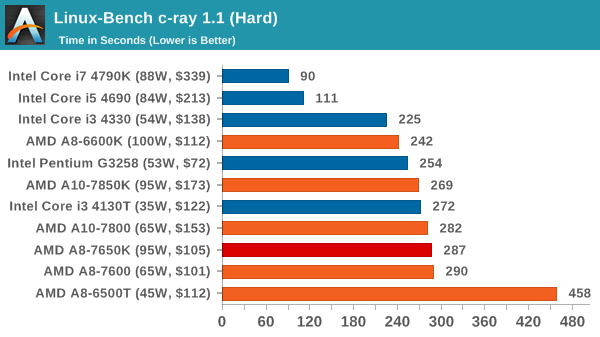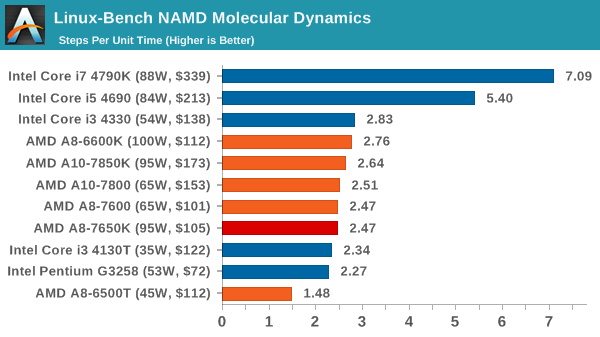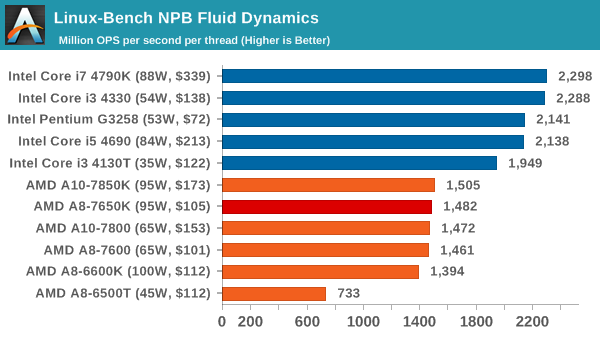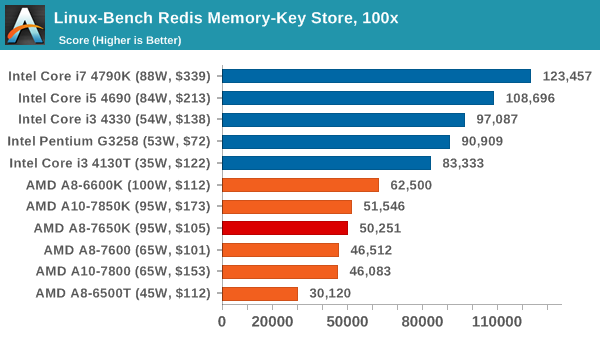The AMD A8-7650K APU Review, Also New Testing Methodology
by Ian Cutress on May 12, 2015 10:00 AM ESTProfessional Performance: Linux
Built around several freely available benchmarks for Linux, Linux-Bench is a project spearheaded by Patrick at ServeTheHome to streamline about a dozen of these tests in a single neat package run via a set of three commands using an Ubuntu 11.04 LiveCD. These tests include fluid dynamics used by NASA, ray-tracing, OpenSSL, molecular modeling, and a scalable data structure server for web deployments. We run Linux-Bench and have chosen to report a select few of the tests that rely on CPU and DRAM speed.
C-Ray: link
C-Ray is a simple ray-tracing program that focuses almost exclusively on processor performance rather than DRAM access. The test in Linux-Bench renders a heavy complex scene offering a large scalable scenario.

Being a scaling benchmark, C-Ray prefers threads and seems more designed for Intel.
NAMD, Scalable Molecular Dynamics: link
Developed by the Theoretical and Computational Biophysics Group at the University of Illinois at Urbana-Champaign, NAMD is a set of parallel molecular dynamics codes for extreme parallelization up to and beyond 200,000 cores. The reference paper detailing NAMD has over 4000 citations, and our testing runs a small simulation where the calculation steps per unit time is the output vector.

NAMD is similar to our office benchmarks, puttin the bulk of the APUs between the i3-4130T and the i3-4330.
NPB, Fluid Dynamics: link
Aside from LINPACK, there are many other ways to benchmark supercomputers in terms of how effective they are for various types of mathematical processes. The NAS Parallel Benchmarks (NPB) are a set of small programs originally designed for NASA to test their supercomputers in terms of fluid dynamics simulations, useful for airflow reactions and design.

Despite the rated memory on the APUs being faster, NPB seems to require more IPC than DRAM speed.
Redis: link
Many of the online applications rely on key-value caches and data structure servers to operate. Redis is an open-source, scalable web technology with a b developer base, but also relies heavily on memory bandwidth as well as CPU performance.











177 Comments
View All Comments
r3loaded - Tuesday, May 12, 2015 - link
Now, more than ever, AMD needs Zen. They still have nothing out on the market that can conclusively beat my four year old 2500K.close - Tuesday, May 12, 2015 - link
Even Intel barely has something that can conclusively beat your four year old 2500K :). Progress isn't what it used to be.Frenetic Pony - Tuesday, May 12, 2015 - link
That's because Intel's efforts are solely focused on laptops/mobile. They dominate the high end, and would only compete with themselves. This at least leaves AMD an opening next year though, as cramming battery life into the Core series has stalled Intel's development of performance per mm^2 other than process shrink.mapesdhs - Tuesday, May 12, 2015 - link
Especially once oc'd of course. What clock are you using?I'm building a 2500K system for a friend atm, easily the best value on a very limited budget.
r3loaded - Tuesday, May 12, 2015 - link
4.5Ghz for full time use on air in my own system. But yeah, even at stock speeds it's still not a contest for the Intel chip.der - Tuesday, May 12, 2015 - link
Awesome testing Methology guys, and definitely a great review.azazel1024 - Tuesday, May 12, 2015 - link
Ian, I'll grant you it isn't abysmal performance and I doubt most casual users would notice a difference. It doesn't seem honest to say that, "While the APUs aren't necessarily ahead in terms of absolute performance, and in some situations they are behind, but with the right combination of hardware the APU route can offer equivalent performance at a cheaper rate"Uhhhh, unless I misread the benchmarks, the AMD processors are at least a little behind to a lot behind vaguely similarly priced Intel processors in the vast majority of CPU benchmarks. That doesn't say "in some" to me, that to me says in most are almost all.
The only place I see them is either extreme budget or your size constrictions prevent you from getting even a cheap discrete graphics card. Cost and performance wise, you'd probably be better off with something like a GTX750 or 750ti combined with an Intel Celeron or Pentium Haswell processor.
I really want Zen to be a turn around.
A quick Amazon check shows that an Intel Haswell Pentium, plus H97 board, plus 2x2GB of DDR3-1600 and a GTX750 would run you in the region of $250. Granted that doesn't include case ($30 for low end), PSU ($40 for a good low power one) or storage ($90 for a 120GB SSD or $50-60 for a 2TB HDD), but it sounds like it was well within that $300 budget considering the bits that could have/were reused...
Deffinitely to each his own, I just think especially once you start getting in to "dual graphics" (even low end), you are almost certainly better if you are talking two discrete cards, or just getting a slightly faster discrete card than relying on the iGPU+dGPU to drive things as well as a somewhat better processor, that might not be any more expensive (or cheaper, Haswell Pentium/Celeron).
galta - Tuesday, May 12, 2015 - link
No matter what people say, AMD is driving itself into an ever tighter corner, be it on the CPU or GPU realms.One really has a hard time trying to justify choosing them over Intel/nVidia, but for some very specific – and sometimes bizarre - circumstances (eg.: because the only thing I do is compact files on WinRar, I end up finding AMD FX and its 8 cores the best cost/benefit ratio!)
A8-7650K is no different.
It is said that things are like that. As a consumer with no intrinsic brand preferences, I would like to see real competition.
anubis44 - Tuesday, May 12, 2015 - link
Try compressing those files using 7Zip, and you'll see a dramatic improvement on the FX-8350. 7Zip is highly optimized for multi-threading, whereas WinRAR is single-threaded.galta - Tuesday, May 12, 2015 - link
No, it's not: http://forums.anandtech.com/showthread.php?t=22533...Even if it were, that's not the point.
How many of us, inclunding the bizarre ones, do only compacting on their PCs?